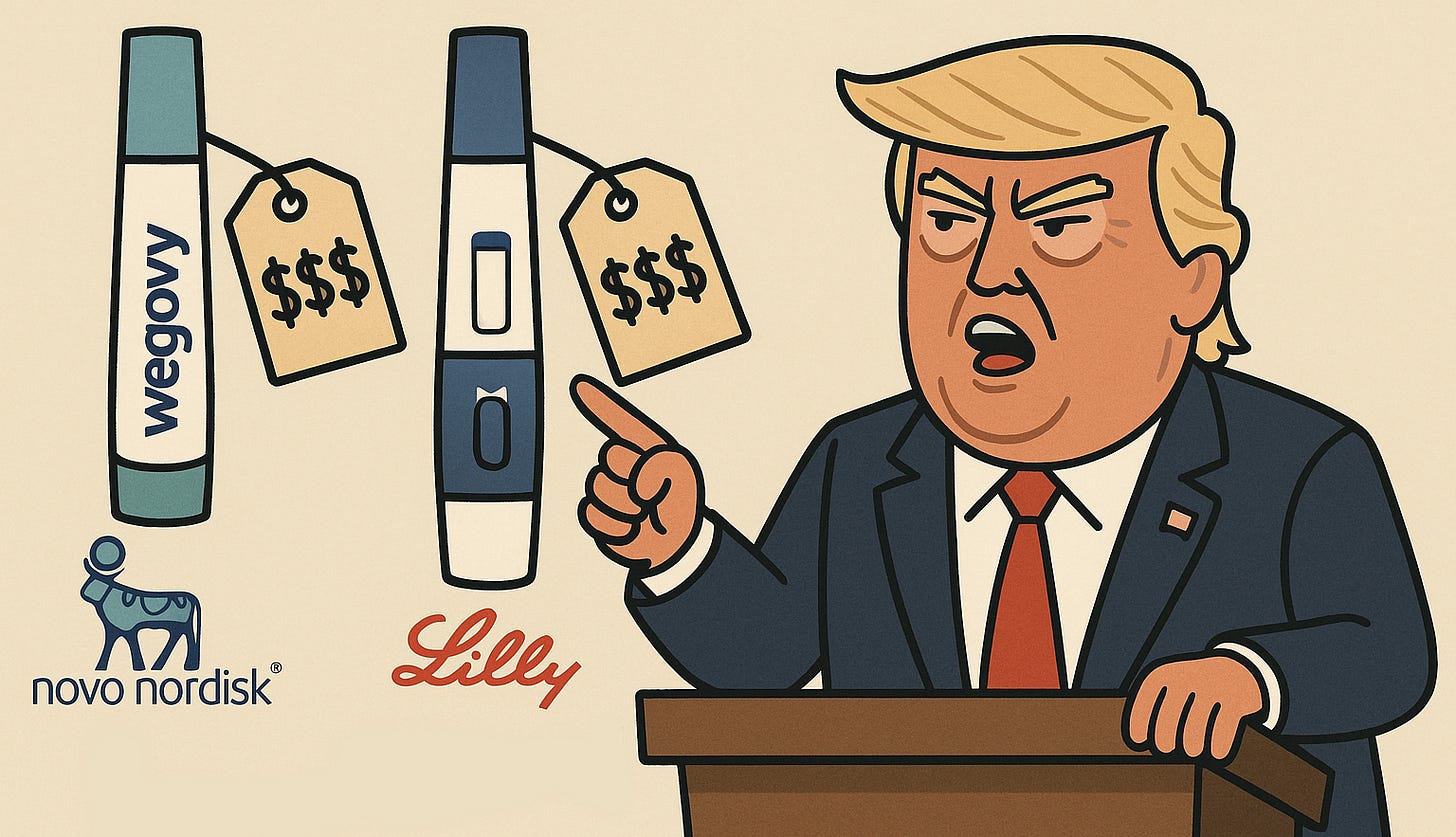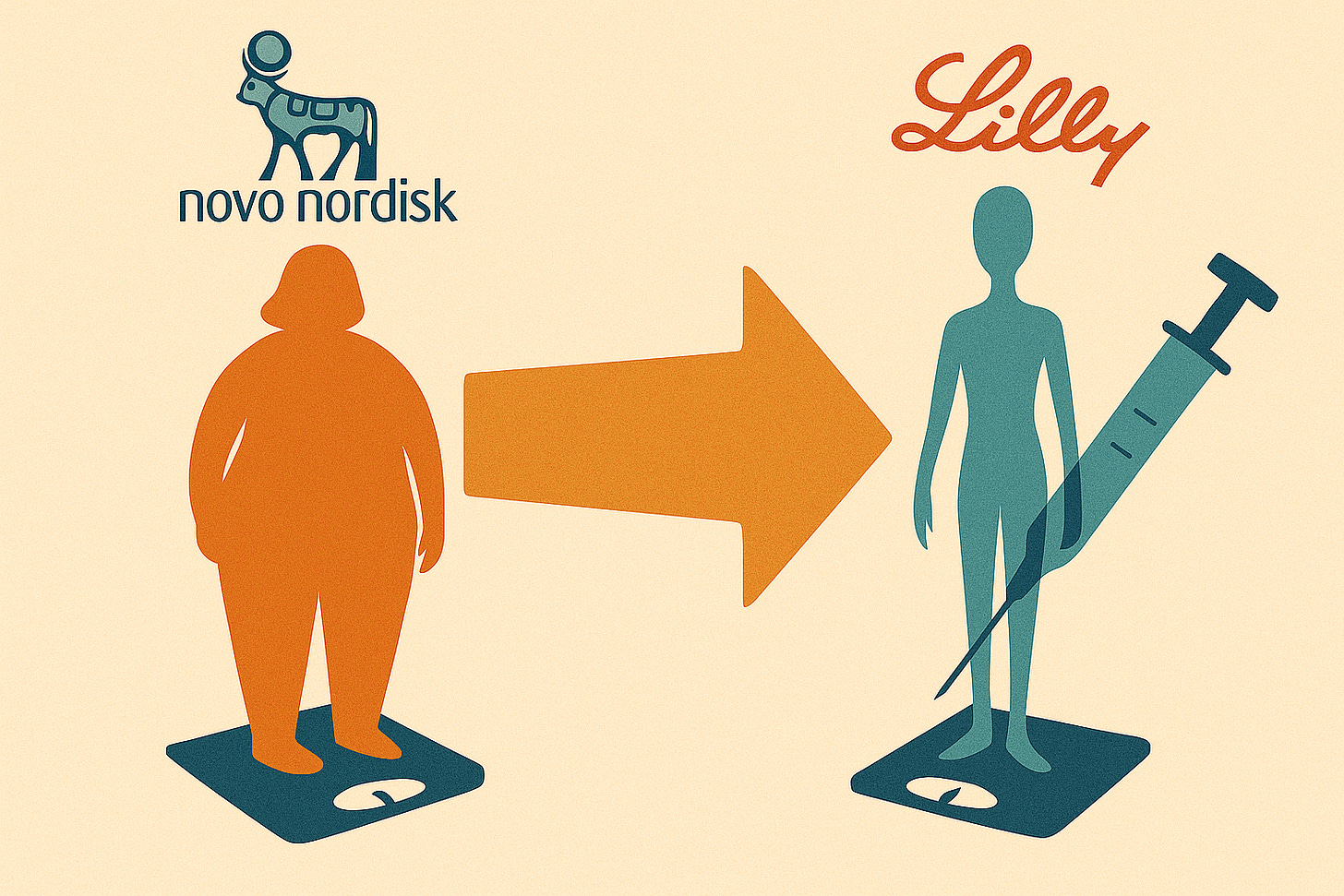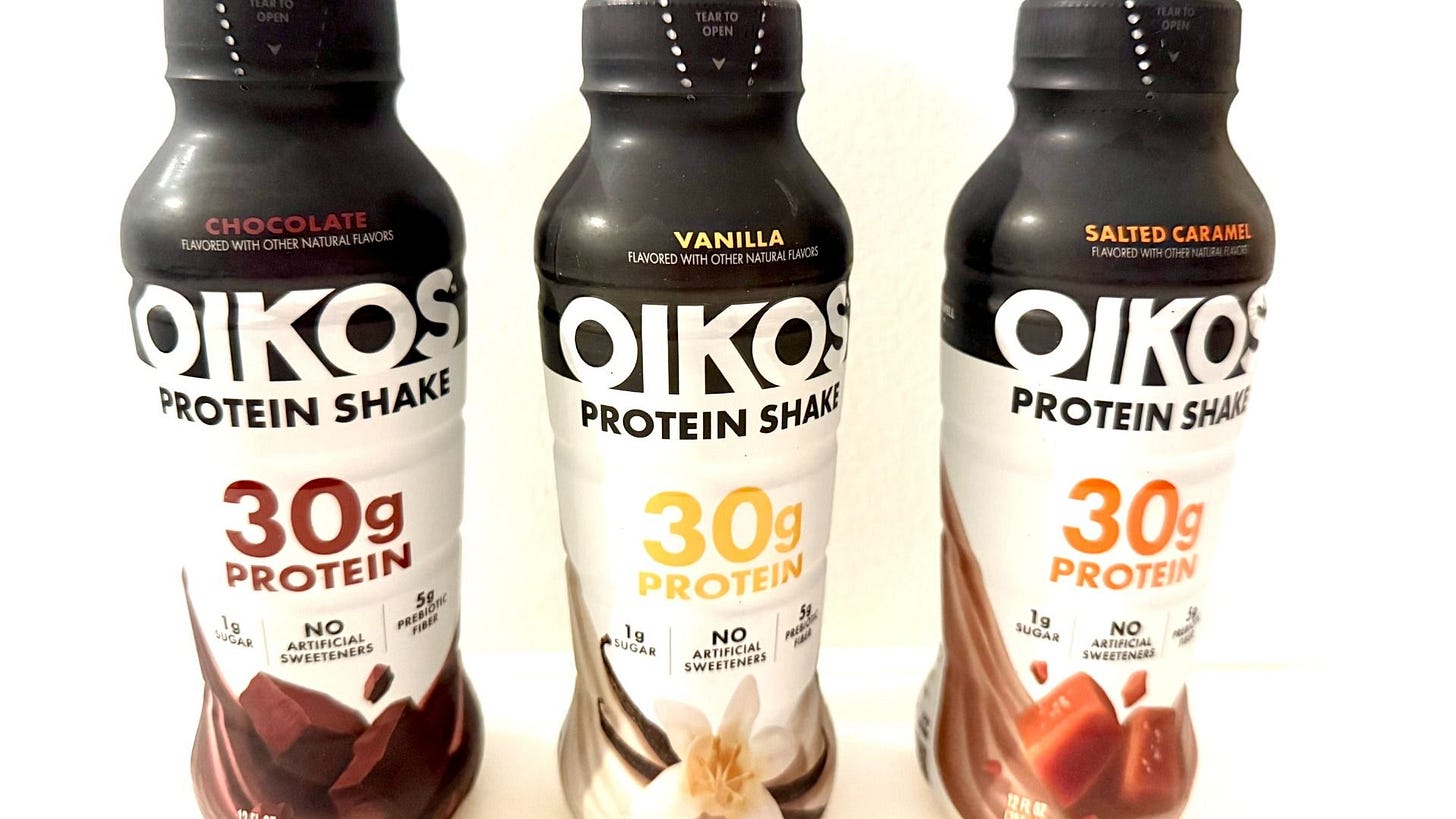The Gut Punch Weekly #20
Trump targets high prices of GLP-1s, Zepbound outperforms Wegovy in weight loss, WeightWatchers files for bankruptcy, weight loss drugs alter taste for meat, and more!
Top Stories
1) Trump Targets High Prices of Wegovy and Zepbound
The Trump administration issued an executive order demanding prescription drugmakers cut prices for weight-loss drugs like Wegovy and Zepbound to align with lower prices seen in other developed countries.
The order threatens new regulations - including export restrictions and tariffs - if companies do not comply.
The order specifically targets drugs with high costs and large spending gaps, such as GLP-1 medications.
While Novo Nordisk and Eli Lilly have introduced $499 monthly cash prices for some patients, the administration aims to make these treatments more affordable for the estimated 40% of Americans with obesity.
Lilly agreed that costs for breakthrough medicines should be shared more fairly across developed countries but argued that intermediaries in the U.S. healthcare system, like pharmacy benefit managers, need to take a smaller share of sales transactions.
(Reuters)
2) Lilly's Zepbound Outperforms Novo's Wegovy in Weight Loss
Eli Lilly's Zepbound demonstrated significantly greater weight loss than Novo Nordisk's Wegovy in the Phase IIIb SURMOUNT-5 trial, while maintaining a similar safety profile and tolerability.
At 72 weeks, Zepbound patients lost an average of 20.2% of body weight compared to 13.7% with Wegovy, confirming Zepbound’s superior benefit-risk ratio according to analysts.
Lilly remains confident in Zepbound's commercial potential despite CVS Caremark's recent decision to prefer Wegovy on its formulary, with CEO David Ricks emphasizing the company's strong market execution.
Beyond Zepbound, Lilly is advancing its next-generation oral GLP-1 drug orforglipron, which has shown promising Phase III results with a 7.9% reduction in body weight over 40 weeks.
(Biospace)
3) WeightWatchers Files for Bankruptcy
WeightWatchers has filed for bankruptcy in the US, aiming to write off $1.15 billion in debt while restructuring payment terms with lenders.
Despite this, the company assures customers it will remain fully operational with no impact on members or its weight-loss programs.
The bankruptcy filing comes as WeightWatchers faces fierce competition from popular weight-loss injections like Ozempic and Mounjaro, which have contributed to a decline in demand for traditional weight-loss programs.
Despite reporting a net loss of $346 million last year and declining subscription revenues, WeightWatchers' clinical business, which includes weight-loss medication, saw a 57% increase in revenues in the first quarter of 2025.
WeightWatchers CEO Tara Comonte remains optimistic about the company's future, emphasizing its ability to help people seeking sustainable weight loss after discontinuing medication use.
(BBC)
4) Weight Loss Drugs Alter Taste for Meat, Fat
A recent study found that people on GLP-1 drugs reported consuming fewer processed foods, fried foods, savory snacks, refined grains, and beef.
The same group increased intake of fruits, leafy greens, and water.
They also reported consuming about 700 fewer calories per day.
Some researchers theorize that the drugs' satiating effect may cause end-of-meal preferences to kick in earlier, making high-fat and savory foods less appealing.
Emerging evidence suggests changes to taste mechanisms may also contribute to altered food preferences.
Some users report flavors becoming stronger or unpleasant, though experiences vary.
Scientists have found GLP-1 receptors in human taste buds, hinting at a possible explanation for taste alterations.
5) Danone's Oikos Launches Protein Shakes for GLP-1 Drug Market
Oikos, known for high-protein yogurt, is expanding into shelf-stable protein shakes designed for users of GLP-1 weight loss drugs.
The new product line, set to launch in May, will be available through major retailers including Amazon, Walmart, Costco, and CVS.
Danone's move follows other food industry giants like Nestlé and Conagra in developing products tailored to the changing appetites of GLP-1 drug users.
This trend is driven by the projected growth in GLP-1 drug usage, with nearly 18 million Americans expected to be taking these medications by 2029.
The Oikos Protein Shakes offer 30 grams of protein and 5 grams of prebiotic fiber per serving, addressing the need for high-protein diets among GLP-1 users to maintain muscle mass during weight loss.
(Axios)
GLP-1 Industry Intel
Lilly Wins Legal Fight Over Tirzepatide Compounding: A Texas judge upheld the FDA's decision to remove tirzepatide from its shortage list, effectively ending compounding pharmacies' ability to produce copycat versions of Eli Lilly's GLP-1 drug.
Novo Nordisk Cuts Profit Forecast as Wegovy Sales Slump: Novo Nordisk cut its profit forecast as US Wegovy prescriptions stalled, reflecting rising competition from Eli Lilly and compounding pharmacies in the weight loss drug market.
Obesity Drug Prices Fluctuate Amid Access Challenges: Weight-loss drugs Wegovy and Zepbound are becoming more accessible through manufacturer discounts and insurance deals, yet remain expensive for many Americans without coverage.
Food & Wellness Industry Intel
Weight Loss Drugs Cut Food Industry Sales: Weight loss drugs like Ozempic and Wegovy are significantly impacting the food industry as users reduce their consumption of high-calorie foods and processed snacks by up to 60%, leading to decreased grocery spending and restaurant visits.
GLP-1 Drugs Essential in Age of Addictive Foods: In an era of addictive ultra-processed foods contributing to America's obesity crisis, GLP-1 drugs offer hope by helping reset appetite and improve health outcomes -- but lasting change requires broader food industry reform and increased medication accessibility.
Weight Loss Drugs Reshape Social Dining Dynamics: Weight loss drug users are developing strategies to handle dining out, from choosing small-plate restaurants to warning servers about their reduced portions.
Wellness Firms Race to Embrace GLP-1 Medications: As WeightWatchers declares bankruptcy due to competition from weight-loss drugs, wellness companies are pivoting to embrace these medications despite facing new compounded GLP-1 restrictions from the FDA.
Frontline Focus
Ex-FDA Chief Loses 60 Pounds, Endorses GLP-1 Drugs: Despite experiencing unpleasant side effects, former FDA commissioner David Kessler lost over 60 pounds using GLP-1 drugs and believes they could revolutionize chronic disease treatment in the US.
Toxic Belly Fat, Not Weight, Key to GLP-1 Success: Medical experts argue that GLP-1 drug prescriptions should target patients with dangerous visceral fat rather than using BMI as the primary criterion.
CVS Deal Forces Zepbound Patients to Switch Medications: CVS Health's deal with Novo Nordisk will remove Eli Lilly's Zepbound from its preferred drug list, forcing hundreds of thousands of patients to switch to Wegovy or face higher costs starting July 2025.
GLP-1 Drugs Slash Hospital Costs by 59%: New research indicates that patients who adhere to GLP-1 medications for at least a year experience significant healthcare cost reductions, including a 59% decrease in hospital costs and 17% lower total medical expenses.
Ozempic Coverage Emerges as Key Employee Benefit: As GLP-1 medications like Ozempic become increasingly sought-after weight loss treatments, 44% of large employers have added coverage to their benefits packages despite high costs.
GLP-1 Clinical Insights
GLP-1 Drugs Reduce BMI in Children with Severe Obesity: Adding GLP-1 drugs to obesity treatment programs helps more children with severe obesity achieve significant BMI reductions and improves their ability to manage hunger and eating habits.
GLP-1 Linked to Increased Pancreatitis Risk: GLP-1 receptor agonists increase risks of pancreatitis and pancreatic cancer in diabetes patients, but the drugs lower overall mortality and hospitalizations.
Wegovy Shows Early Heart Protection in Obese Patients: A new analysis of the SELECT trial reveals that Wegovy significantly reduced major adverse cardiovascular events within just three months of treatment in patients with obesity and established cardiovascular disease.
GLP-1 Drugs Show Promise for PCOS Weight Management: A comprehensive meta-analysis reveals GLP-1 receptor agonists significantly improve body weight and metabolic parameters in PCOS patients, suggesting their potential as an alternative to traditional treatments like metformin.
The Bleeding Edge
Protein Blockers Prevent Muscle Loss During GLP-1 Treatment: Blocking GDF8 and activin A during GLP-1 obesity treatment preserves muscle mass and boosts fat loss, potentially improving weight loss outcomes and metabolic health in obese subjects.
AI Unlocks Real-World GLP-1 Drug Insights from EHR Data: Veradigm announced an AI-powered advancement in analyzing electronic health records to generate real-world evidence about GLP-1 medications, enabling researchers to uncover insights about side effects, discontinuation reasons, and social determinants of health.
AI Genetic Test Predicts GLP-1 Drug Nausea Risk: An AI-powered genetic test from Phenomix and Mayo Clinic can predict which obesity patients are at higher risk of nausea from GLP-1 drugs, enabling more personalized and tolerable treatment plans.









